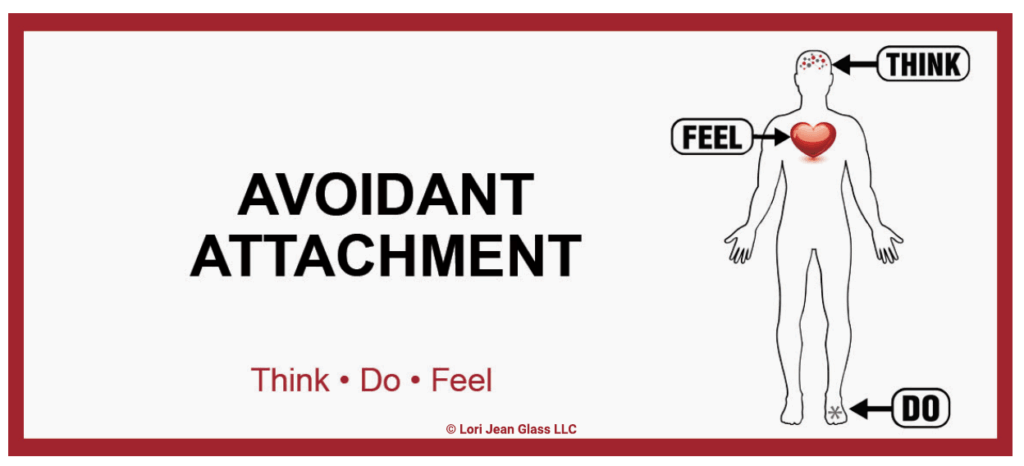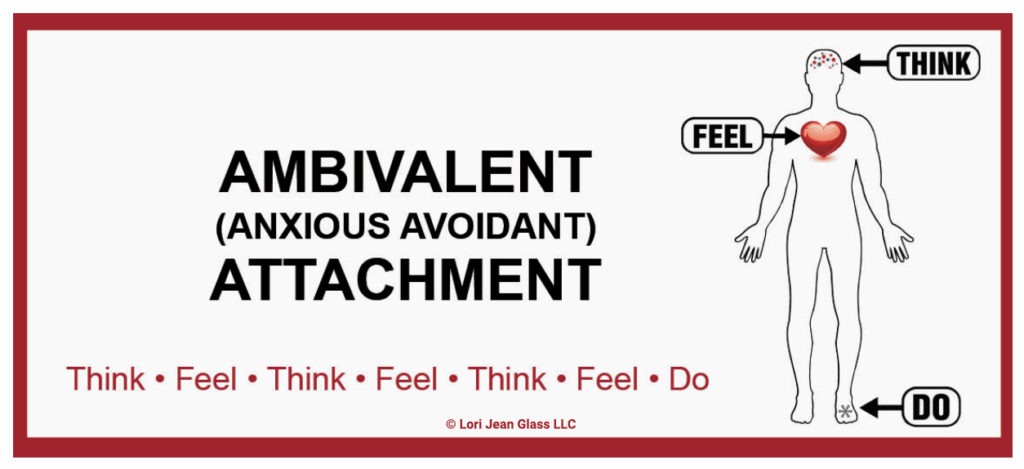For some individuals, thinking about being in a relationship can activate feelings of wanting to run away. Why? Because they feel that the needs of a partner, family member, or employer are overwhelming.
Attachment theory explains the development of attachment styles, which are formed through early interactions with caregivers. Unfortunately, many individuals find themselves attracted to avoidant or ambivalent partners. These attachment styles can significantly influence adult relationships, often leading to a series of unhealthy patterns which cause a great deal of pain for both sides in the relationship. If this is the case with you and your partner, consider love avoidance coaching or intensive workshops which can give you the tools and resources you need to heal your attachment wounds.
Read on to learn more about love avoidance and ambivalence.
[template_part_attachment_quiz]
What Is Avoidant Attachment?
Avoidant attachment is the inability and fear to show love. Individuals will carefully guard themselves when in relationships and avoid real intimacy… to protect themselves from rejection, loss and pain. Often they are not even aware of the behavior and it can be misunderstood as selfishness.
Unfortunately, denial and avoidance become habits, which keeps the individual from being seen, feeling connected and loved.
Paradoxically, the individual will often want more but will go outside the relationship to get what they want, because it feels safer.

The avoidant thinks first, then takes action, and then sometimes processes their feelings after the action. What happens next is sometimes regret, doubt, uncertainty, and/or confusion.
People with avoidance issues have difficulty trusting others and will distance themselves if a relationship feels too close. Experiences in early childhood are usually the cause of this, and they use avoidance to try to feel safe within an intimate relationship.
How Do You Know If You Have an Avoidant Attachment Style?
Do you think you or your partner have avoidance issues? That may be the case if you notice that you tend to be uncomfortable with intimacy in your relationship and have a way of escaping commitment when you start to feel stifled or suffocated.
If you worry your partner is avoidant, you may want to look for signs such as:
- Not returning your texts or calls
- Idealizing a past relationship
- Sending mixed signals
- Keeping secrets
- Childish and sullen behavior
- Showing mistrust
- Escaping commitment
Of course, these are just some of the signs your partner may exhibit in your relationship. However, if you feel like most of these signs ring true, you may want to consider professional couple counseling or relationship therapy workshops.
Do Avoidants Fall In Love?
Despite the name, love avoidants actually crave love and affection, just like everyone else. However, they often exhibit insecure attachment styles due to their childhood wounds, making it more difficult for them to face disappointment and betrayal than other people. As a result, they tend to guard their feelings and do all they can to avoid being hurt in their relationships. They are not running away from love, they are running away from pain. In contrast, individuals with secure attachment styles are more likely to form healthy relationships and handle emotional challenges effectively.
Why Are Love Avoidants Attracted to Love Addicts?
Both love addicts and love avoidants often carry deeply ingrained fears and insecurities that stem from their childhood. On one hand, addicts crave affection and love that they rarely received from their parent or caregiver. Love avoidants, on the other hand, typically try to run from intimacy to avoid getting engulfed and hurt once again.
While the relationship may work initially, it is bound to come with its own set of challenges. As the love addict showers the avoidant with love and affection, the avoidant will inevitably start to pull away. The distancing of the avoidant will lead the addict to seek even more reassurance and affection as proof of the avoidant’s love. This cycle often repeats itself. This is what many refer to as a love addicted tango.
How Do You Deal With A Love Avoidant?
Being in a relationship with an avoidant partner can be extremely challenging, especially for a love addict. But despite the challenges, it is possible to create a deep connection with an avoidant, but only if they are willing to put in some effort, too. Here’s how you can improve your relationship with an avoidant partner:
- Be patient and show your partner that they can trust you
- Give your partner some space instead of chasing them
- Keep in mind that their love avoidance is not your fault
- Be understanding and dependable without overwhelming them
- Learn the differences between the wants and needs for the relationship between you and your partner
- Recognize your own unhealthy survival patterns
- Set healthy boundaries
- Don’t neglect your own needs
What Is Ambivalent Attachment?
Another way attachment shows up is if the individual is unavailable for intimacy. This means they are caught up in feeling anxious and also at times avoidant. This is the type of person that communicates “come here – go away”. This is known as being Ambivalent.

The ambivalent (or anxious avoidant) gets stuck in a prolonged cycle of thoughts and feelings, with little to no action. Freezing is the familiarity, even if it is painful, confusing, or exhausting.
The coping strategies that are avoidant or ambivalent which people use relate to creating an intensity in other activities outside the relationship, such as non-intimate sex, work, shopping, drugs and alcohol.
Among all of the attachment styles, ambivalent attachment seems to be the most chaotic. This is because ambivalent attachment tends to come from a childhood in which the parent or caregiver was inconsistent in providing love and affection. In another example- divorce between parents can create a separation and level of confusion for a child or adolescent. Imagine either parent sending completely different messages or signals to their children during their formative years and through their adolescence that conflict or are misaligned.
How Do You Know If You Have an Ambivalent Attachment Style?
Being ambivalent in your relationships or living with an ambivalent partner can be exhausting. If you’re worried that your partner has an ambivalent attachment style, look for the following traits:
- Is your partner constantly critical or picky?
- Do they have a history of short relationships?
- Are they confused about what they want from the relationship?
- Do they always seem distant or busy?
- Are their actions unpredictable?
- Are they hesitant to make long-term plans?
If you never feel sure of what your partner feels or thinks, it’s likely that you feel lost and confused about the nature of your relationship. If that’s the case, it would probably be a good idea to seek expert help if you want to salvage the relationship and improve your mental health.
Link Between Attachment Style And Depression
The Glass House Retreat helps avoidant and ambivalent individuals find their voice and use it.
When the avoidant or ambivalent behavior is defined and understood, it becomes a starting point to treat the underlying causes that create love avoidance. If this isn’t treated, then it often leads to depression.
When an individual has difficulty deciding whether to leave a relationship, this indecisiveness can lead to a combination of feeling anxious and depressed.
Why Is Attachment Important To Physical And Mental Health?
Avoidant and ambivalent attachment behaviors can significantly decrease the quality of your life, especially when it comes to your interpersonal relationships. In fact, the style of our attachment is a key factor in our physical and mental health. Here’s how:
- The relationship with our caregivers will shape our intimate relationships and influence our adult attachment styles
- Unhealthy attachment can result in difficulties with understanding our emotions.
- In turn, we may struggle with relating to the emotions of other people.
- Without healthy connections with others, we may struggle with anxiety and depression.
- Our attachment style can make it hard to bounce back from disappointment and failure.
These attachment styles can affect adult relationships by influencing emotional behavior and partner dynamics. As you can see, your attachment style is a key factor in determining your personal relationships. Because of this, working on your attachment can be incredibly useful for improving your intimate relationships and overall wellbeing.
What Causes Love Avoidance and Ambivalence?
Individuals need love and connection with others. However, if you have suffered from feelings of abandonment or loss as a child, then you are likely to develop an insecure attachment style, which can lead to difficulty forming healthy attachments in adulthood, which can lead to avoidance or ambivalence.
Avoidance or ambivalence can also occur from experiencing abuse or neglect as a child from parents, siblings, other family members, teachers, coaches, bullies and friends.
If you’re wondering if you or a loved one has Avoidance behaviors, here are the most common signs and characteristics to look for.
Most Common Characteristics And Signs Of Avoidant Attachment
Individuals with an avoidant attachment style tend to exhibit a number of characteristic behaviors, including:
- Avoid intimacy in the relationship by creating an intensity in other activities outside the relationship
- Craving independence at all costs
- Emotional withdrawal and bottling up emotions
- Avoid being known in the relationship
- Distance themselves from intimate contact to keep from feeling engulfed
- Over-controlling parenting when young
- Secretive behavior – hiding feelings
- Need to be seen and adored and then escape
- Refusal to acknowledge the existence of a problem
- Tolerance for high-risk behavior
- Denial that there is a problem
Most Common Characteristics And Signs Of Ambivalent Attachment
If you’re wondering if you or a loved one has Ambivalent behaviors, here are the most common signs and characteristics to look for:
- They let other things outside of the relationship get in the way, i.e., hobbies, work, friends, lovers, addictions—anything.
- Typically, they had one anxious and one avoidant parent attachment style
- They have a “come here, go away” relational pattern
- Crave love and fear it
- Avoid intimacy by obsessing about love through romantic fantasies about unavailable people
- They sexualize relationships such that emotional intimacy is non-existent and then become addicted to the sex or the relationship—often both.
- They become addicted through romantic affairs rather than committed relationships
- They struggle to open to a deeper level of emotional intimacy, and yet they are unable to let go of the relationship.
Can Avoidance or Ambivalence Be Treated?
YES!
The first step starts with being aware of and recognizing the symptoms. It is about healing yourself and being committed to being able to attach securely by knowing what you want and need in a relationship based on your personal storyline and background.
The process includes dealing with feelings and healing from past wounds. Healing allows you to reconnect to yourself with self-compassion and self-love.
We recommend that you seek support from professionals and talk about the pain that’s inside of you.
Remember, you are worthy of happiness and love and a healthy relationship. You can have relational freedom.
How can you deal with ambivalent or avoidant attachment?

Coping with their attachment style is a long and stressful process for most people. This is because we’re often unaware of the exact issues that stem from our relationship with our caregiver in our early childhood and finding out exactly how much it has affected us can be both eye-opening and terrifying.
The first step to overcoming your insecure attachment is to get acquainted with your past. Understanding exactly how you became the person you are now can help you accept and reconcile with your childhood experiences.
This is best done through professional therapy and attending different workshops and programs designed to help you improve your relationships and your overall well being. But if you want to take some steps on your own, here’s what you should do:
- Start by identifying your emotions and expressing your needs without fear.
- Strive to be as authentic in your communication as possible.
- Combat your shame and work on your self-esteem.
- Try not to criticize yourself and accept your flaws.
- Work on compromising and seeing your partner’s perspective.
Of course, these are just some of the steps you can take to start on your path to recovery. In addition to these general coping techniques, you should also seek professional support if you want to improve your relationships and the quality of your life.
How To Overcome Insecure Attachment: Our Love Avoidance Intensive Workshops Can Help!
We provide support and healing for these individuals by providing a personal PIVOT coach or coming to The Glass House and taking a 5-day deep dive into the PIVOT process. We provide defining attachment styles, one on one sessions, group process and experiential therapies to encourage individuals to be seen, respected, and understood.

In addition, we offer intensive programs designed to repair and restore relational challenges. Learn more about the PIVOT process and our programs. We’re here to help.



















